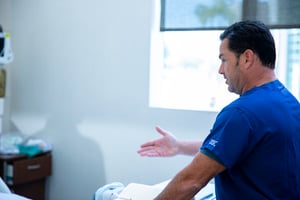If you are preparing for minimally invasive spine surgery, you may have been told that you’ll need to go under general anesthesia. This means you’ll be given special medications to put you into a temporary unconscious state for the procedure.
It’s normal to have some questions about this, especially if you’ve never experienced general anesthesia before. Some people even worry more about the anesthesia than the surgery itself. But once you know what you can expect from the process (and all the steps that are taken to keep you safe), it’ll seem less intimidating. Here’s what you need to know when preparing for surgery.
Before Surgery
 You should expect a discussion with your healthcare team for an assessment as your surgery approaches. You’ll discuss your medical history and any medications or supplements that you are taking. Your anesthesiologist will also want to know whether you have any allergies or have had a reaction to anesthesia in the past. Different types of anesthesia are available, and this information allows your anesthesiologist to select what’s best for you. The morning of surgery, you will review everything again with your anesthesiologist.
You should expect a discussion with your healthcare team for an assessment as your surgery approaches. You’ll discuss your medical history and any medications or supplements that you are taking. Your anesthesiologist will also want to know whether you have any allergies or have had a reaction to anesthesia in the past. Different types of anesthesia are available, and this information allows your anesthesiologist to select what’s best for you. The morning of surgery, you will review everything again with your anesthesiologist.
It is important to have an empty stomach when you go into surgery, so you’ll be given guidelines on when you need to stop eating and drinking the night before.
You’ll also be told if you need to adjust your medications leading up to surgery. For example, some medications, such as aspirin or blood thinners, usually need to be stopped for a period of time, though others should be taken as normal the night before or the morning of surgery.
In the Operating Room

After you arrive at the surgical facility, you’ll be prepared for surgery in the private preoperative suites. Here, you’ll meet with your anesthesiologist and surgeon. A nurse will start an IV to deliver medication and fluids throughout the surgery.
Shortly after you are brought into the operating room, your anesthesiologist will begin your anesthesia. General anesthesia is either given through your IV, as a gas that you inhale through a face mask, or a combination of both. As the anesthesia is initiated, you’ll gently fall asleep, often within seconds. A breathing tube may be inserted through your mouth into your trachea to help you breathe during the procedure.
During your operation, you will be continuously monitored by your anesthesiologist. Anesthesia blocks the sensation of pain, so you don’t have to worry about feeling anything as the surgery takes place. Your vital signs (breathing rate, heart rate, temperature, and blood pressure) will be closely monitored. Your anesthesiologist can adjust your medications or give you IV fluids or blood as needed.
After Surgery
Once your spine surgery is finished, your anesthesiologist will reverse your anesthesia medications, allowing you to regain consciousness. You may feel surprised that your surgery is over “so quickly” because anesthesia makes the entire process seem to have lasted only seconds.
You may feel a bit “out of it” or not fully awake for a little while as the anesthesia continues to wear off. You may have a bit of a sore throat if you received a breathing tube during surgery. Be sure to let your nurse know if you are experiencing any side effects. Medications, or even a few extra blankets, may be able to make you feel more comfortable. At DISC, we have developed a customized process to alleviate the side effects by using a combination of anesthesia drugs to prevent nausea and help patients recover quicker. Usually, within the first half hour, your loved ones will be by your side.
Because most minimally invasive spine surgeries are done in an outpatient setting, you most likely won’t be spending the night. It’s not safe to drive right after being under general anesthesia, so you’ll need to make sure you have a friend or family member to drive you home, where you can continue to recover comfortably.
When preparing for surgery, you should feel confident about the entire process, including who’s in charge of your anesthesia. At DISC Sports & Spine Center, our board-certified anesthesiologist, Dr. Joseph J. Barrows, is here to provide that confidence. With his personalized approach to each case, his patients know they are safe in his hands. Schedule an appointment at DISC to learn how Dr. Barrows can help you.
ARTICLE CATEGORIES:

About the author
Joseph Barrows, MD A board certified anesthesiologist with extensive training, Dr. Joseph J. Barrows serves as Medical Director of DISC Surgery Center at Newport Beach. In this role, he brings a commitment to top-level care, taking a personalized and highly detailed approach that ensures his patients’ safety and comfort before, during and after surgery. Dr. Barrows is particularly adept at eliminating post-operative nausea and vomiting (PONV), which afflicts as many as 30% of patients undergoing anesthesia. Combining his specialized training with thorough questioning and a focus on the nuances surrounding each unique case, he is able to personalize treatment plans, thereby preventing PONV in more than 95% of DISC’s patients. Read more articles by Joseph Barrows, MD.





